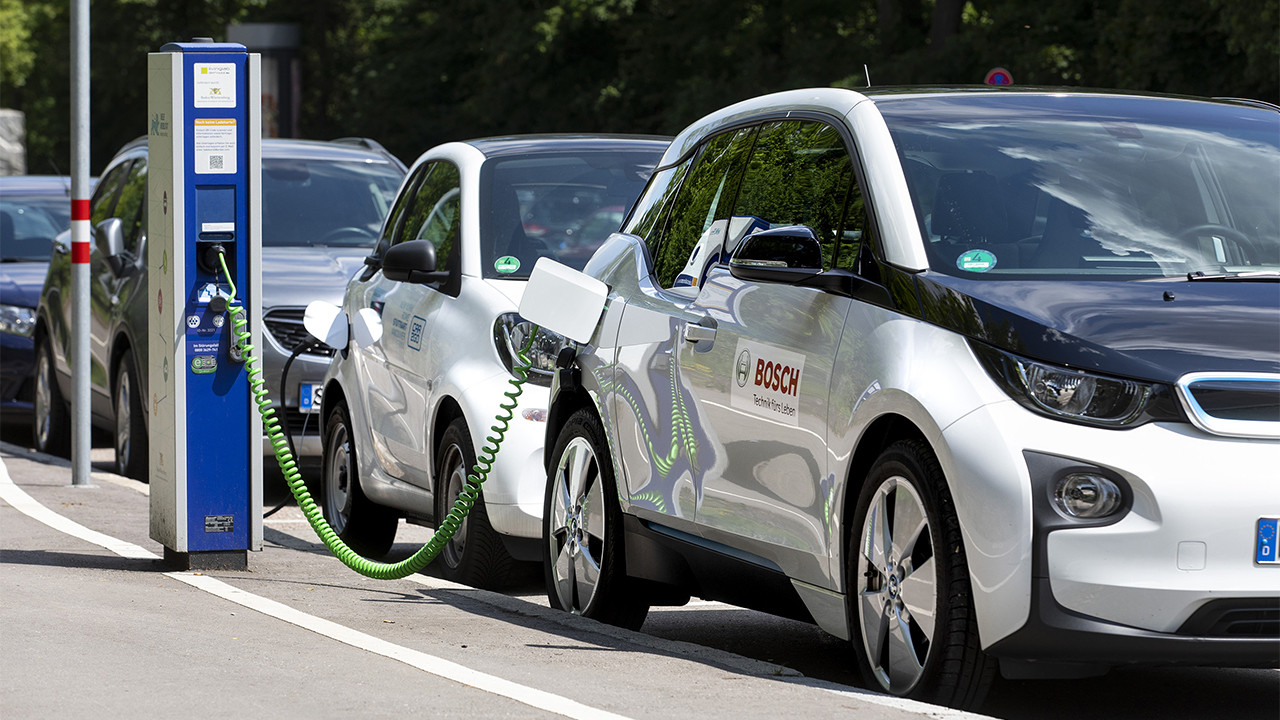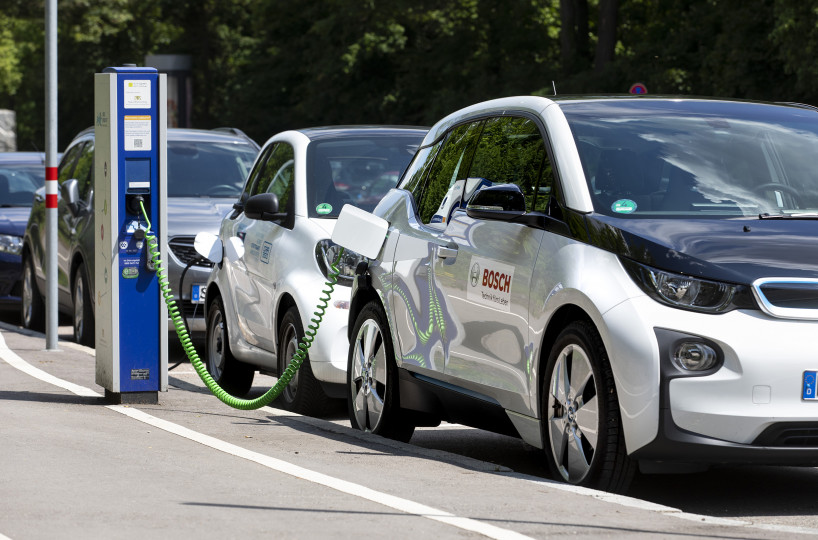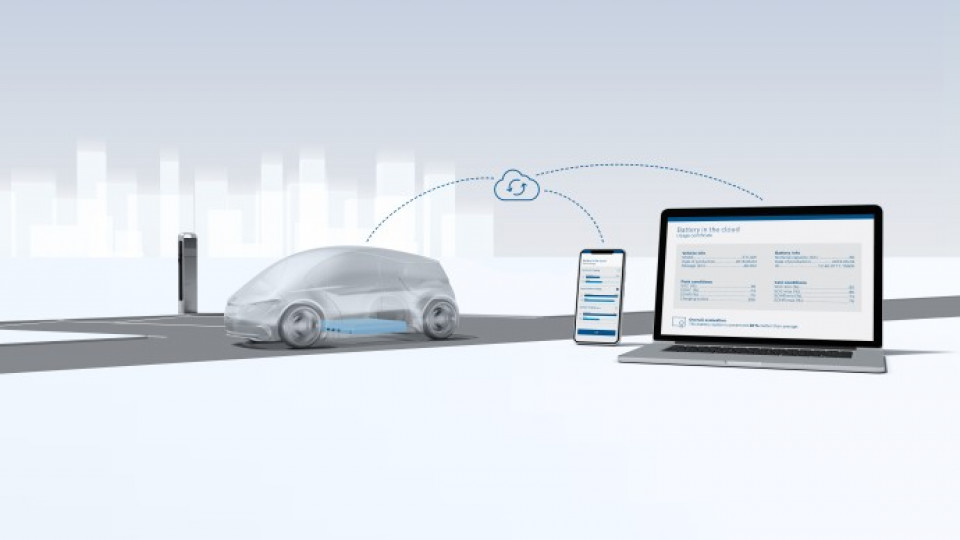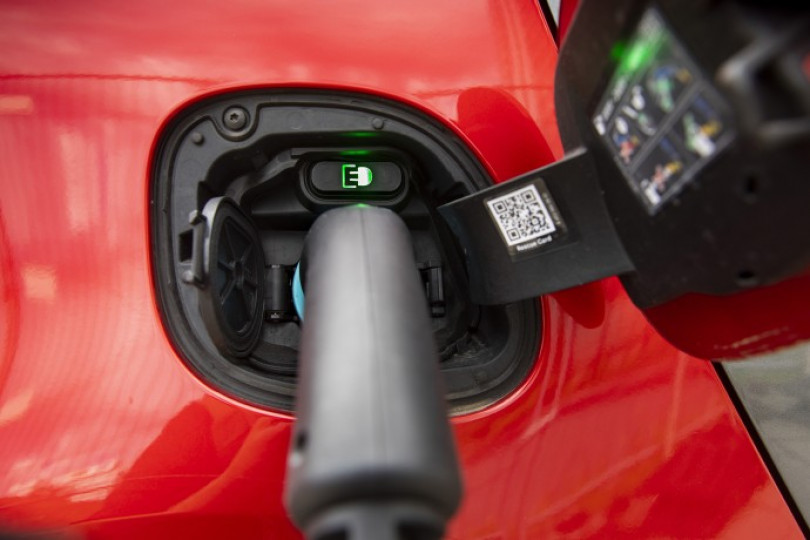Stuttgart, Germany – Stress makes cells age faster. Something that geneticists have long since demonstrated for the human body is also true for electric-vehicle battery cells. The older the batteries get, the lower their performance and capacity, and the shorter the range of the vehicle. To help batteries last longer, Bosch is developing new cloud services that supplement the individual vehicles’ battery-management systems. “Bosch is connecting electric-vehicle batteries with the cloud. Its data-based services mean we can substantially improve batteries’ performance and extend their service life,” says Dr. Markus Heyn, member of the board of management of Robert Bosch GmbH. Smart software functions in the cloud continually analyze the battery status and take appropriate action to prevent or slow down cell aging. These measures can reduce the wear and tear on the battery, the most expensive component of an electric vehicle, by as much as 20 percent. Real-time data gathered from the vehicle and its surroundings plays a key role here. The cloud services utilize this data to optimize every single recharging process and to provide drivers with tailored driving tips on how to conserve battery power via the dash display. Didi Chuxing, a globally leading mobility platform based in China, is working with Bosch to introduce Battery in the Cloud across DiDi’s electric vehicle fleet. The aim is to optimize battery performance, thus benefiting both drivers and fleet operators within DiDi’s ecosystem.
Precise real-time analysis
According to experts, the average service life of today’s lithium-ion batteries is 8-10 years or between 500 and 1,000 charge cycles. Battery makers usually guarantee mileage of between 100,000 and 160,000 kilometers. But rapid battery charging, high numbers of charge cycles, an overly sporty driving style, and extremely high or low ambient temperatures are all sources of stress for batteries, which makes them age faster. Bosch’s cloud-based services are designed to recognize – and counter – these stress triggers. All battery-relevant data – e.g. current ambient temperature and charging habits – is first transmitted in real time to the cloud, where machine-learning algorithms evaluate the data. With these services, Bosch is not only offering a window into the battery’s current status at all times, but enabling a reliable forecast of a battery’s remaining service life and performance to be made for the first time. Previously, it was not possible to make any accurate forecast of how quickly an electric-vehicle battery would wear out. “Powerful batteries with long services lives will make electromobility more viable,” said Heyn. Another feature of the smart software functions is their use of the swarm principle: the algorithms used for analysis evaluate data gathered from an entire fleet, not just from individual vehicles. Swarm intelligence is the key to identifying more of the stress factors for vehicle batteries, and to identifying them more quickly.
Protecting cells against aging
The new insights gained into a battery’s current status enable Bosch to also actively protect it against aging. To give one example: fully-charged batteries age more quickly at particularly high or low ambient temperatures. Bosch’s cloud services thus ensure that batteries are not charged to 100 percent when conditions are too hot or too cold. By reducing the battery charge by only a few percentage points, the battery is protected against inadvertent wear and tear. Data in the cloud will also help improve battery maintenance and repair. As soon as a battery fault or defect is identified, for example, the driver or fleet operator can be notified. This increases the chances that a battery can be repaired before it becomes irrevocably damaged or stops working altogether. Finally, the cloud services also optimize the recharging process itself. The recharging process – which, by the way, is one of the biggest obstacles to creating a mass market for electromobility – harbors the danger that the battery cells permanently lose some of their performance and capacity. Smart software in the cloud can calculate an individual charge curve for each recharging process, regardless of whether it takes place at home or elsewhere. This means the battery is recharged to the optimum level, helping conserve the cells. Whereas existing apps with charge timers merely allow drivers to time the recharging process so that it is carried out when demand for electricity is low, the Bosch solution goes much further, offering a specially developed recharging process as part of the company’s new battery services. They optimize both fast and slow charging and control electricity and voltage levels during the recharging process, thus prolonging battery life.
Q&A
What is the difference between Bosch cloud services and conventional battery-management systems?
The battery-management systems currently integrated in electric vehicles monitor and manage the battery cells, and ensure both reliable operations and uniform recharging of the battery cells. But a battery’s performance and service life depend on numerous factors, such as the frequency with which it is recharged and discharged, the type of recharging process used, the driving style, and external factors such as the ambient temperature. That is why Bosch has developed cloud services that supplement the conventional battery-management systems installed in electric vehicles.
Why is Bosch developing its own recharging strategies?
Up to now, different recharging processes have been programmed into electric vehicles. Going forward, Bosch will offer automakers innovative recharging strategies that complement the processes available. When, for example, drivers want to recharge their batteries faster, a rapid recharge process automatically shortens the time required without damaging the battery. Another strategy optimizes the more leisurely standard recharging process, which can take several hours. The Bosch process is especially gentle on the battery, enhancing both its capacity and service life.
Zita Hella Varga
Phone: +36 70 667-6374
Mobility Solutions is the largest Bosch Group business sector. In 2018, its sales came to 47.6 billion euros, or 61 percent of total group sales. This makes the Bosch Group one of the leading automotive suppliers. The Mobility Solutions business sector pursues a vision of mobility that is accident-free, emissions-free, and fascinating, and combines the group’s expertise in the domains of automation, electrification, and connectivity. For its customers, the outcome is integrated mobility solutions. The business sector’s main areas of activity are injection technology and powertrain peripherals for internal-combustion engines, diverse solutions for powertrain electrification, vehicle safety systems, driver-assistance and automated functions, technology for user-friendly infotainment as well as vehicle-to-vehicle and vehicle-to-infrastructure communication, repair-shop concepts, and technology and services for the automotive aftermarket. Bosch is synonymous with important automotive innovations, such as electronic engine management, the ESP anti-skid system, and common-rail diesel technology.
The Bosch Group is a leading global supplier of technology and services. It employs roughly 410,000 associates worldwide (as of December 31, 2018). The company generated sales of 78.5 billion euros in 2018. Its operations are divided into four business sectors: Mobility Solutions, Industrial Technology, Consumer Goods, and Energy and Building Technology. As a leading IoT company, Bosch offers innovative solutions for smart homes, smart cities, connected mobility, and connected manufacturing. It uses its expertise in sensor technology, software, and services, as well as its own IoT cloud, to offer its customers connected, cross-domain solutions from a single source. The Bosch Group’s strategic objective is to deliver innovations for a connected life. Bosch improves quality of life worldwide with products and services that are innovative and spark enthusiasm. In short, Bosch creates technology that is “Invented for life.” The Bosch Group comprises Robert Bosch GmbH and its roughly 460 subsidiary and regional companies in over 60 countries. Including sales and service partners, Bosch’s global manufacturing, engineering, and sales network covers nearly every country in the world. The basis for the company’s future growth is its innovative strength. At nearly 130 locations across the globe, Bosch employs some 68,700 associates in research and development.
Additional information is available online at www.bosch.com, www.iot.bosch.com, www.bosch-press.com, www.twitter.com/BoschPresse







